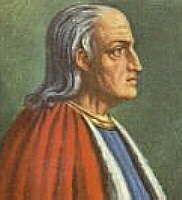Anselm of Canterbury (1033-1109)

The end of the “Dark Ages” in the philosophical tradition is clearly marked by the work of Anselm of Canterbury. Explicitly rejecting the anti-intellectual spirit of preceding centuries, Anselm devoted great care to his cultivation of the Augustinian theology of “faith seeking understanding.” In the process, Anselm initiated an entirely new way of demonstrating the existence of god.
Although born at Aosta in Alpine Italy and educated in Normandy, Anselm became a Benedictine monk, teacher, and abbot at Bec and continued his ecclesiastical career in England. Having been appointed the second Norman archbishop of Canterbury in 1093, Anselm secured the Westminster Agreement of 1107, guaranteeing the (partial) independence of the church from the civil state.
Anselm’s combination of Christianity, neoplatonic metaphysics, and Aristotelean logic in the form of dialectical question-and-answer was an important influence in the development scholasticism during the next several centuries.
As a philosopher, Anselm is most often remembered for his attempts to prove the existence of god: In De Veritate (Of Truth) he argued that all creatures owe their being and value to god as the source of all truth, to whom a life lived well is the highest praise. In the Monologion he described deity as the one most truly good thing, from which all real moral values derive and whose existence is required by the reality of those values.

Anselm’s Ontological Argument
Most famously, in the Proslogion, Anselm proposed the famous Ontological Argument, according to which god is understood as “aliquid quod maius non cogitari potest” (“that than which nothing greater can be conceived”). The being so conceived must necessarily exist in reality as well as in thought, he argued, since otherwise it would in fact be possible to conceive something greater—namely, something exactly similar except that it really does exist. The argument takes a Psalmist quote (“Fools say in their hearts, ‘There is no god'”) quite literally by supposing that in virtue of the content of the concept of god there is a contradiction involved in the denial of god’s existence. Thus, at least for Anselmian believers guided by a prior faith, god must truly exist as the simple, unified source of all perfections, a reality that excludes corruption, imperfection, and deception of every sort.
Anselm supposes that in order to affirm or deny anything about god, we must first form in our minds the appropriate concept, namely the concept of “that than which nothing greater can be conceived” (in Latin, “aliquid quod maius non cogitari potest“). Having done so, we have in mind the idea of god. But of course nothing about reality usually follows from what we have in mind, since we often think about things that do not (or even cannot) actually exist. In the case of this special concept, however, Anselm argued that what we can think of must in fact exist independently of our thinking of it.
Suppose the alternative: if that than which nothing greater can be conceived existed only in my mind and not in reality, then I could easily think of something else which would in fact be greater than this (namely, the same thing existing in reality as well as in my mind), so that what I originally contemplated turns out not in fact to be that than which nothing greater can be conceived. Since this is a contradiction, only a fool would believe it. So that than which nothing greater can be conceived (that is, god) must exist in reality as well as in the mind.
Something certainly seems fishy about this argument. It is extraordinary to suppose that merely thinking about something makes it so. But it turns out to be difficult to specify precisely what the problem is with Anselm’s reasoning here.
Objections and Reformulations
Early objections (like those of the monk Gaunilo) focussed on the notion of conceivability at work here, proposing a similarly absurd argument for the reality of the most perfect conceivable island. But Anselm‘s claim is that only the concept of god unites all of the perfections under the umbrella of absolute unsurpassibility. What is more, Anselm supposed that existence is an essential feature of god’s nature, and many philosophers have pointed out that existence is not a feature that could properly be included in the essence of any object. But the restatement of the argument in Proslogion 3 seems to suggest that it is necessary, not merely contingent, existence that must be predicated of the deity, and this version may avoid the conceivability issue altogether.
Perhaps the real difficulty with this argument has less to do with conceivability than with the idea of perfection in general, with its attendant notion of unsurpassability. “The person taller than whom no other person is now living” must truly exist in reality as well as in our minds (provided that there is at least one living person), but it is not clear that “the person taller than whom no other person can ever live” exists as a coherent concept even in the understanding, much less in reality. In similar fashion, it may be that there is no concept corresponding to the words, “that than which nothing greater can be conceived,” giving the ontological argument no foundation.
Despite all of these difficulties, Anselm’s effort has continued to find sympathetic supporters for nearly a millennium. Remember that within the Augustinian approach, the demonstration is not really intended as a proof that will persuade unbelievers to convert. Rather, it occurs within the context of prayerful meditation, as one element in the believer’s ongoing pursuit of faith seeking understanding.
Candela Citations
- Anselm of Canterbury. Authored by: Garth Kemerling. Provided by: The Philosophy Pages. Located at: http://www.philosophypages.com/ph/anse.htm. License: CC BY-SA: Attribution-ShareAlike
- Origins of Scholasticism. Authored by: Garth Kemerling. Provided by: The Philosophy Pages. Located at: http://www.philosophypages.com/hy/3f.htm. License: CC BY-SA: Attribution-ShareAlike
